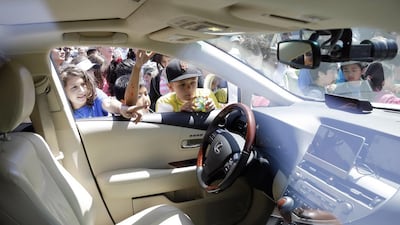Berlin // The race is on among the world’s top car makers, parts firms – and Google – to develop truly driverless vehicles.
Google says it will take just a few more years. Others say a decade is more realistic. And BMW, despite its engineering skills, says it isn’t in a hurry to be first.
Daimler successfully tested a prototype S-Class limousine in a complicated inner-city environment this year, while Google has a fleet of modified cars on the road in the United States that have driven accident-free for hundreds of thousands of kilometres.
Sweden’s Volvo last year sent a convoy of self-driven vehicles for a 200km journey on a Spanish motorway. Four of the vehicles were automatically driven and hooked up wirelessly to copy the manoeuvres of the car in front, with a human driver at the wheel.
The test was carried out as part of a European Commission research project known as Sartre – Safe road trains for the environment.
BMW has been testing an autonomous car on the motorway between the cities of Munich and Nuremberg, at speeds of more than 110km an hour.
Intriguingly, however, BMW says winning the race to develop a driverless car is not a priority given that the brand prides itself on giving drivers “the pleasure of driving”. The car maker says it has been listening carefully to drivers, many of whom would be reluctant to relinquish control of their vehicle.
The electric car company Tesla Motors said last month it was working to produce a car capable of running on “auto-pilot” within three years.
The California-based firm’s autonomous car would allow the driver to hand 90 per cent of the control of the car over to the vehicle’s computer system. Fully autonomous cars would take longer to develop.
The vehicle will be developed in-house using Tesla’s own technology, not that of another company.
Nissan has pledged to bring “multiple affordable, energy-efficient, fully autonomous-driving vehicles to the market by 2020”. The Japanese company has been working on self-driving technology with universities including the Massachusetts Institute of Technology; Stanford; University of California, Berkeley; Carnegie- Mellon; Oxford; and the University of Tokyo. The car maker presented its autonomous Lef prototype at an event in the United States this year.
Toyota, the world’s biggest car maker, has also joined the fray, revealing details of its research into its self-driving cars earlier this year. Ahead of the Consumer Electronics Show in Las Vegas, Toyota showed off a Lexus research vehicle equipped to detect and automatically respond to its surroundings.
Volkswagen and a team of researchers from Stanford University developed an autonomous Audi sports car that whizzed around several racetracks in the US.
Major car components suppliers are also getting in on the act.
Germany’s Continental is investing €100 million (Dh497m) into researching self-driving technology this year. Bosch, which says it is the global market leader for ultrasound sensors used for parking assistance systems in cars, has been testing its own driverless car, a modified BMW, on German roads.
And researchers in France last year modified a Renault Espace to drive on its own.
business@thenational.ae

